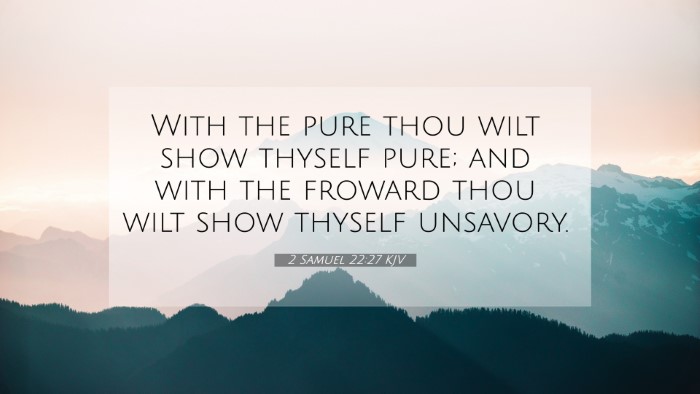Understanding 2 Samuel 22:27
2 Samuel 22:27 states:
"With the pure you will show yourself pure; and with the devious you will show yourself shrewd."
This verse is a pivotal declaration illustrating God's justice and moral nature. Below, we explore the meanings and implications of this verse based on insights from public domain commentaries.
Summary of Key Themes
- The purity of God: This verse emphasizes that God aligns Himself with the pure-hearted.
- Consequences of moral character: The treatment one receives from God reflects their moral character.
- The necessity of righteousness: The text encourages adherence to a moral and just life.
Detailed Analysis
According to Matthew Henry, this verse is indicative of God's unchanging nature. He notes that:
- Those who uphold purity and integrity will experience God’s favor.
- On the contrary, those with cunning or deceitful hearts will find their own craftiness turned against them.
Albert Barnes elaborates on the implications of this verse by stating that:
- This serves as an assurance for the faithful; God acts justly toward His followers.
- He points out that the word "devious" highlights a moral failing that results in divine judgment.
Adam Clarke offers additional insights, suggesting that:
- The “pure” represent those who strive for holiness and righteousness.
- Conversely, the “devious” include those who engage in manipulation or deceit.
Cross-References
This verse connects to several other biblical texts, enhancing the understanding of its message:
- Psalm 18:25-26: "With the merciful you will show yourself merciful; with the blameless man you will show yourself blameless."
- Proverbs 2:8: "He guards the paths of justice, and preserves the ways of His saints."
- Isaiah 57:15: "For thus says the One who is high and lifted up, who inhabits eternity, whose name is Holy: 'I dwell in the high and holy place, and also with him who is of a contrite and lowly spirit...'"
- Galatians 6:7: "Do not be deceived: God is not mocked, for whatever one sows, that will he also reap."
- Romans 2:6: "He will render to each one according to his works."
- Matthew 5:8: "Blessed are the pure in heart, for they shall see God."
- James 4:6: "But he gives more grace. Therefore it says, 'God opposes the proud, but gives grace to the humble.'
Connections and Themes
The insights provided by the commentators highlight a deeper understanding of the themes of purity and divine justice present within 2 Samuel 22:27. Here are some thematic connections derived from the verse:
- Divine Justice: God's treatment of individuals is tied to their moral character, reinforcing the idea that justice is central to His nature.
- The Call to Righteousness: Believers are encouraged to pursue righteousness as a means of receiving God's favor.
- Responsibility of Conduct: The implications of one’s actions are emphasized, showing that one's deeds and character shape their relationship with God.
Practical Application
In the context of personal faith and conduct, 2 Samuel 22:27 serves as a powerful reminder for believers:
- Engage in self-reflection to ensure one's actions are aligned with divine righteousness.
- Seek to cultivate a heart that mirrors God's purity to receive His blessings.
- Recognize that moral integrity fosters a deeper relationship with God.
Conclusion
2 Samuel 22:27 encapsulates the essence of God's relationship with humanity based on moral integrity. It affirms that those who are pure will experience His goodness, whereas those who are devious will face the consequences of their actions. Through cross-referencing biblical texts, one can see a consistent theme of divine justice throughout scripture, reinforcing the notion that God's character remains the same across the Old and New Testaments.
For more profound study, utilizing tools for Bible cross-referencing and resources like a Bible concordance or cross-reference Bible study guide can significantly enhance one’s understanding of interconnected biblical themes.









